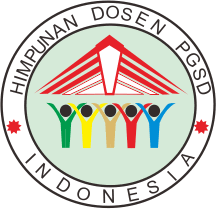Analisis kemampuan guru dalam penggunaan perangkat chromebook pada pembelajaran IPAS di kelas V sekolah dasar
Abstract
The aim of this research is to describe teachers' abilities in using chromebook media in science and social studies learning in class V of SD Negeri Cinderejo, Surakarta city. This research is qualitative descriptive research with a case study approach. The research subject was a fifth grade teacher at Cinderejo State Elementary School, Surakarta City. The data collection techniques used were written tests, observations, interviews. and documentation. Content validity is carried out by expert assessment. Data validity uses source triangulation and technical triangulation. The data analysis used is the interactive analysis of the Miles and Huberman model. The research results show that the ability of class V teachers to use chromebook media is theoretically in the "very good" category with an average score for each variable of 90.75% obtained through test results. However, the practical ability of class V teachers in using chromebook media in science and science learning in class V is included in the "sufficient" category with a score of 41.9% obtained through observation results. Based on the research results, it can be concluded that the teacher's teachers' abilities in using chromebook media in science and social studies learning in class V of SD Negeri Cinderejo, Surakarta City has a gap between theory and practice due to time factors and technical support.
Keywords
Full Text:
PDFReferences
[1] Yuliana, C., Hanim, Z., Huda, M. S., & Yamin, M. (2023). Sumber Daya Lembaga Dalam Praktek
Dunia Pendidikan. Journal on Education, 06(1), 2285–2294.
[2] Wahyuni, A. S., & Dewi, A. O. P. (2019). Persepsi Pemustaka terhadap Desain Antarmuka
Pengguna (User Interface) Aplikasi Perpustakaan Digital “iJogja” Berbasis Android. Jurnal Ilmu Perpustakaan, 7(1), 21–30.
[3] Fatikhah, M. H., & Samsiyah, N. (2023). Peningkatan Hasil Belajar IPAS Melalui Media Chromebook. Pendas: Jurnal Ilmiah Pendidikan Dasar, 09(01), 1402–1411.
[4] Sugiyono. (2015). Metode Penelitian Pendidikan. Alfabeta.
[5] Champa, R. A., Rochsantiningsih, D., & Kristiana, D. (2019). Teachers’ Readiness Indicators on ICT Integration into their Teaching. Budapest International Research and Critics in Linguistics and Education (BirLE) Journal, 2(4), 195–203. https://doi.org/10.33258/birle.v2i4.508
[7] Rohita, Fitria, N., & Haryadi, D. (2018). Pemanfaatanaplikasi Penyusunan Perencanaan Pembelajaran (Ap3) Dalam Penyusunan Perencanaan Pembelajaranbagi Guru Taman Kanak-Kanak Di Jakarta. Jurnal Pengabdian Kepada Masyarakat, 24(2), 644–654.
[8] Nadeak, E., Elfaladonna, F., & Malahayati, M. (2023). Pelatihan Pembuatan Modul Ajar Interaktif Bagi Guru dengan Menggunakan Canva (Studi Kasus: SDN 204 Palembang). Jurnal Masyarakat Madani Indonesia, 2(3), 201–206. https://doi.org/10.59025/js.v2i3.103
[9] Putra, L. D., & Pratama, S. Z. A. (2023). Pemanfatan Media Dan Teknologi Digital Dalam Mengatasi Masalah Pembelajaran. Journal Transformation of Mandalika, 4(8), 323–329. http://ojs.cahayamandalika.com/index.php/jtm/issue/archive
[10] Afrilian, A. (2017). Pemanfaatan Teknologi Informasi sebagai Sumber Belajar Siswa Kelas XI IPS SMA Negeri 1 Tengaran. Universitas Kristen Satya Wacana .
[11] Suryana, F., Jalinus, N., Rahmad, R., & Efendi, R. (2020). Cooperative Project Based Learning Models in Programming Languages: A Proposed. International Journal of Advanced Science and Technology, 29(06), 1876–1886. https://doi.org/10.13140/RG.2.2.22440.80646
[12] Marlina, B. (2021). Pemanfaatan Google Workspace For Education Pada Pembelajaran Daring. Prosiding Seminar Nasional Pendidikan Program Pascasarjana Universitas Pgri Palembang, 87–92.
[13] Sodiq, M., Mahfud, H., & Adi, F. P. (2021). Persepsi guru dan peserta didik terhadap penggunaan aplikasi berbasis web “Quizizz” sebagai media pembelajaran di sekolah dasar. Didaktika Dwija Indria, 9(5).
[14] Dewi, T. S., Suryandari, K. C., & Rokhmaniyah. (2023). Analysis of Teacher and Student Readiness in the Implementation of Critical and Creative Oriented Chromebook Media. Social Humanities, and Educational Studies (SHES): Coference Series, 6(3), 241–245.
[15] Wiranata, W. (2022). Efektivitas Penggunaan Chromebook dalam Penerapan Pembelajaran Flipped Classroom Berbasis E-Learning Google Classroom pada Konsep Unsur dan Senyawa [Skripsi, Universitas Islam Negeri Syarif Hidayatullah]. https://repository.uinjkt.ac.id/dspace/handle/123456789/62030
[16] Nie, L. (2019). Utilizing Chromebook in Ontario Elementary Schools: Teachers’ Perspectives. http://hdl.handle.net/10464/14457
[17] Sari, D. H., & R Widianto Atmojo, dan I. (2023). Keefektifan peran guru dalam pembelajaran tatap muka pasca pandemi covid-19 pada kelas v di sekolah dasar. Didaktika Dwija Indria, 11(2).
[18] Sari, S. (2023). Problematika pelaksanaan pembelajaran IPAS kurikulum merdeka materi masyarakat yang beradab kelas IV sekolah dasar. Didaktika Dwija Indria, 11(5).
[19] Astuti, A. P., Suyoto, S., Sumarno, S., & Rumiarci, E. (2023). Penggunaan Chromebook Pada Peserta Didik Kelas V SD Negeri Sambirejo 02 Semarang. Jurnal Educatio , 9(2), 938–942.
[20] Fitriah, D., Meggie, & Mirianda, U. (2019). Kesiapan Guru Dalam Menghadapi Tantangan Pendidikan Berbasis Teknologi. Seminar Nasional Pendidikan Program Pascasarjana Universitas PGRI Palembang, 148–153. https://jurnal.univpgri-palembang.ac.id/index.php/Prosidingpps/article/view/2982
[21] Cilliers, E. J. (2017). The Challenge Of Teaching Generation Z. People: International Journal of Social Sciences, 3(1), 188–198. https://doi.org/10.20319/pijss.2017.31.188198
Refbacks
- There are currently no refbacks.



